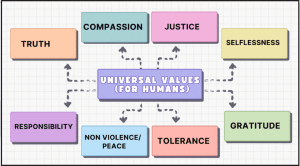Ethical Relativism
It is the concept that suggests ethical principles and moral values are subjective and vary across different cultures, societies, or individuals. According to this, what is considered morally right or wrong is dependent upon the social norms of a society & there is no universal standard for morality. It therefore differs from society to society.
When ethical judgments vary across different societies emphasizing on the point that moral standards are dependent upon the particular social norms and are not universally applicable.
Social norms are unwritten standards of behavior which guide behavior of people. They are based on tradition, culture, custom and practices of society which have evolved with the evolution of society. Since social norms are derived from society, they become a sort of foundation for all other values & standards including moral and ethical standards although social norms differ society to society because each society is different & so its traditions, customs & values.
Examples: The recent ongoing issues are:
-
- LGBT rights
- Gay marriage
As per the stand taken by the government, gay marriage is against Indian social norms and tradition and marriage is an institution. But as per the western sandards, some countirres allow gay marriage.
-
- Anti conversion laws, Anti cow slaughter laws are considered ethical for indian society in contrast to western society.
Ethical universalism
It is the view that certain ethical principles apply universally and apply to all individuals, cultures, and societies. They are the standards set by the normative theories of ethics. They have absolute character.
Immanuel Kant also proposed the concept of the “categorical imperative,” a moral principle that commands individuals to act according to rules that could be universally applied without contradiction.





